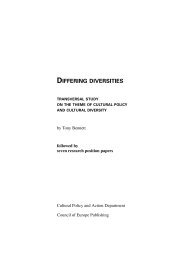Why we need European cultural policies: the impact of EU ...
Why we need European cultural policies: the impact of EU ...
Why we need European cultural policies: the impact of EU ...
Create successful ePaper yourself
Turn your PDF publications into a flip-book with our unique Google optimized e-Paper software.
obstacles encountered during <strong>the</strong> period <strong>of</strong> evaluation <strong>of</strong> <strong>the</strong> results <strong>of</strong> <strong>the</strong> Council <strong>of</strong> Europe’sproject also apply when trying to understand <strong>the</strong> confusion in <strong>the</strong> approach to culture at <strong>EU</strong> level.The third reason for <strong>the</strong> lack <strong>of</strong> comprehensive research is <strong>the</strong> sheer range <strong>of</strong> policy approacheswithin <strong>the</strong> <strong>cultural</strong> sector itself. Some believe that this means it is better to simply stick to studyingspecific policy fields, such as book policy, audio-visual policy or copyright issues. Ho<strong>we</strong>ver, sometopics, such as mobility <strong>of</strong> artists and <strong>cultural</strong> pr<strong>of</strong>essionals, or regulation <strong>of</strong> markets for <strong>cultural</strong>goods and services, require a more holistic approach that goes across more than one sector. Ihave used many <strong>of</strong> those valuable studies on specific sectors for this research because it wouldhave been totally impracticable to try to ga<strong>the</strong>r original information on each <strong>of</strong> <strong>the</strong>se issues.Focus <strong>of</strong> <strong>the</strong> researchFollowing on from <strong>the</strong>se preliminary reflections, this study focusses on three main topics.The first focusses on methodological problems relevant for comparative research <strong>of</strong> <strong>cultural</strong><strong>policies</strong> in Europe. In my view, <strong>the</strong>se methodological problems and debates have contributed to<strong>the</strong> ra<strong>the</strong>r confusing treatment <strong>of</strong> culture and <strong>cultural</strong> <strong>policies</strong> in <strong>the</strong> <strong>European</strong> Union. Some <strong>of</strong><strong>the</strong>se issues include reflections on <strong>the</strong> existence or non-existence <strong>of</strong> <strong>European</strong> <strong>cultural</strong> policy,debates about <strong>the</strong> <strong>need</strong> to have a <strong>European</strong> <strong>cultural</strong> policy or, for example, <strong>the</strong> consequences<strong>of</strong> <strong>the</strong> way in which <strong>policies</strong> on culture in general and <strong>policies</strong> about audio-visual matters areadministratively kept apart by <strong>the</strong> <strong>European</strong> Commission. Even though <strong>the</strong>re have been manyvaluable studies <strong>of</strong> <strong>the</strong>se topics, it was necessary to repeat some <strong>of</strong> <strong>the</strong> findings <strong>of</strong> those studieshere, as <strong>the</strong>y are crucial for understanding <strong>the</strong> position <strong>of</strong> culture in <strong>the</strong> process <strong>of</strong> <strong>European</strong>integration.The second part <strong>of</strong> <strong>the</strong> study gives an overview <strong>of</strong> different <strong>policies</strong> and policy areas that havealready had an <strong>impact</strong> on culture, or might do so in <strong>the</strong> future. My aim was to identify in particularthose <strong>policies</strong>, shared by different countries, which have been establishing links bet<strong>we</strong>en <strong>cultural</strong>and economic aspects <strong>of</strong> production and distribution <strong>of</strong> <strong>cultural</strong> goods and services.In order to find out more about researchers’ and policy-makers’ perception <strong>of</strong> <strong>the</strong> importance<strong>of</strong> <strong>EU</strong> enlargement for <strong>cultural</strong> <strong>policies</strong> in post-socialist countries, I surveyed a small number<strong>of</strong> respondents in ten selected countries to see if <strong>the</strong>se policy areas, which I had identified asrelevant for culture, have been perceived as such and if <strong>the</strong>re was any evidence <strong>of</strong> direct orindirect <strong>impact</strong> on policy-making. The results <strong>of</strong> this survey, as <strong>we</strong>ll as <strong>the</strong> results <strong>of</strong> several related14Introduction














